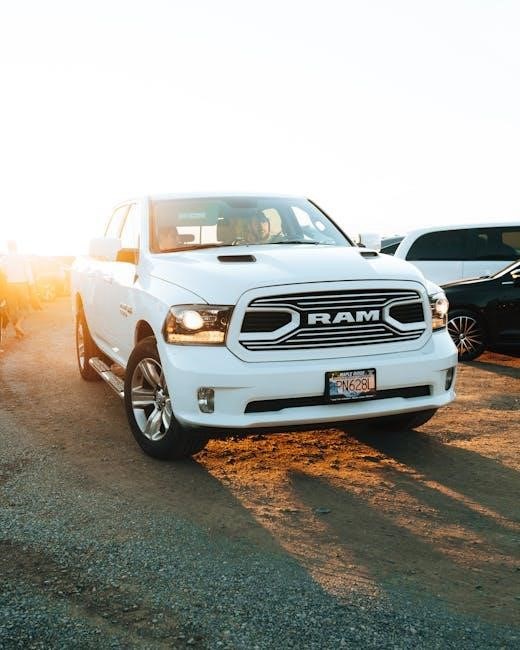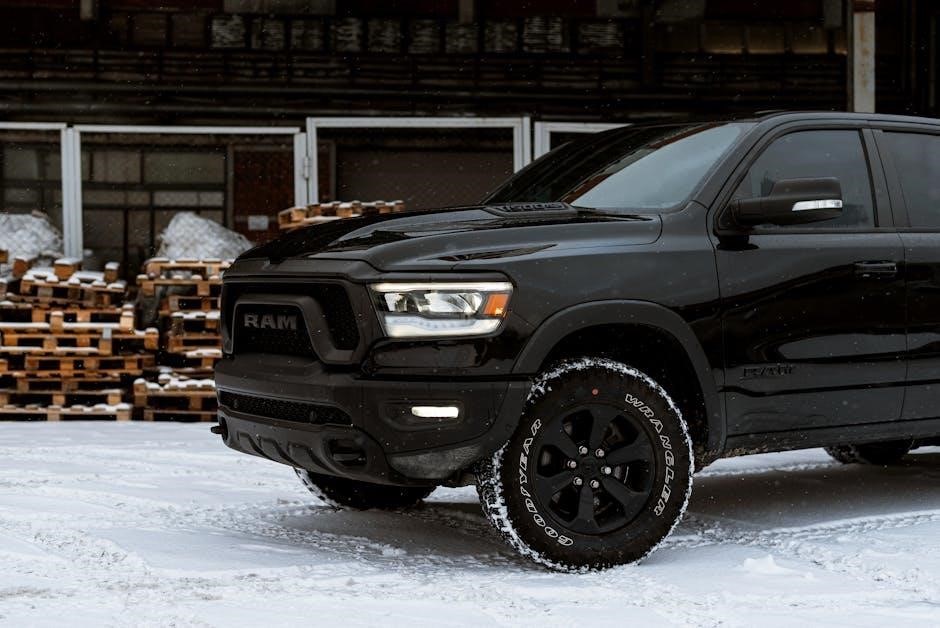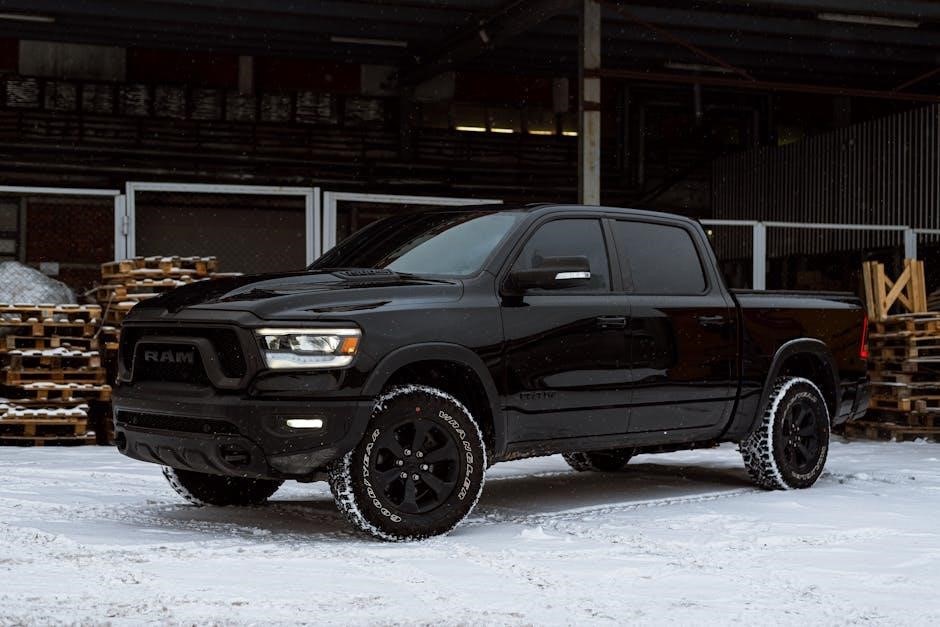
ram trucks/and/towing guide
Ram trucks are formidable vehicles known for their durability and towing prowess. With robust engines and advanced towing technologies, they excel in hauling heavy loads effortlessly and safely.
Overview of RAM Trucks and Their Towing Capabilities
Ram trucks are renowned for their exceptional power and reliability, making them a top choice for towing. With a range of models like the 1500, 2500, and 3500, these vehicles deliver impressive towing capacities tailored to different needs. Equipped with robust engines, high torque outputs, and advanced axle ratios, Ram trucks excel at hauling heavy trailers, RVs, and equipment. Their towing capabilities are enhanced by features like Trailer Assist and integrated towing systems, ensuring stability and control. Whether for recreational or commercial use, Ram trucks consistently deliver superior performance, safety, and durability, solidifying their reputation as leaders in the towing segment.
Why RAM Trucks Are Popular for Towing
Ram trucks are highly sought after for towing due to their unmatched combination of power, durability, and advanced technology. Their strong engine options, including diesel variants, provide the necessary torque for heavy loads. Features like Trailer Assist and integrated towing systems enhance ease and safety. Additionally, Ram trucks offer impressive payload capacities and a smooth towing experience, making them ideal for both recreational and professional use. Their reputation for reliability and resilience further cements their popularity among those who prioritize performance and dependability in their towing needs.

Understanding Towing Capacity
Towing capacity is the maximum weight a RAM truck can safely tow, determined by factors like engine power and axle ratio. It ensures safety and optimal performance while hauling. Always consult your owner’s manual for specific specifications.
How Towing Capacity is Determined for RAM Trucks
Towing capacity for RAM trucks is calculated based on factors such as engine specifications, axle ratio, transmission type, and vehicle curb weight. Engineers simulate various towing scenarios to ensure the truck can handle different loads safely. The gross combined weight rating (GCWR) and maximum trailer weight rating are key determinants. Additionally, RAM incorporates advanced technologies like trailer assist systems to enhance towing performance, ensuring that the truck operates within its limits and provides a smooth towing experience for drivers.
Factors That Affect Towing Capacity
The towing capacity of RAM trucks is influenced by several factors, including engine power, axle ratio, transmission type, and vehicle curb weight. The weight distribution of the trailer, tongue weight, and hitch setup also play significant roles. Environmental conditions, such as altitude and temperature, can impact performance. Additionally, the driver’s experience and adherence to proper towing practices are critical. Understanding these factors ensures safe and efficient towing, as exceeding limits can compromise safety and damage the vehicle. RAM trucks are engineered to handle heavy loads, but awareness of these variables is essential for optimal towing performance.
How to Find the Towing Capacity of Your RAM Truck
To determine the towing capacity of your RAM truck, consult the owner’s manual or the vehicle’s certification label on the driver’s side doorjamb. You can also use RAM’s online towing guide, which provides detailed specifications for each model and configuration. Inputting your truck’s VIN on RAM’s website or authorized dealership tools can give precise towing limits. Additionally, check the tire information placard on the driver’s doorjamb for axle ratios and payload ratings. Always cross-reference these sources to ensure accurate and safe towing capabilities tailored to your specific RAM truck.

Safe Towing Practices
Safe towing practices are essential for ensuring security and control while hauling heavy loads with your RAM truck. Adhering to guidelines and understanding your vehicle’s limitations is crucial.
Proper Load Distribution for Safe Towing
Proper load distribution is critical for safe towing with your RAM truck. Ensuring the weight is evenly spread across the trailer and vehicle prevents swaying and maintains stability. Always secure heavy items near the trailer’s front and balance lighter ones towards the back. Using a weight-distributing hitch can help evenly distribute the load between the truck and trailer. Additionally, avoiding overloading the rear axle is essential to maintain control and prevent potential hazards while towing. Regularly checking the load balance ensures a smooth and secure towing experience. Proper distribution enhances safety and reduces the risk of accidents on the road.
Choosing the Right Hitch for Your RAM Truck
Selecting the right hitch for your RAM truck is essential for safe and efficient towing. The most common types include Class III, Class IV, and Class V hitches, each designed for different towing needs. Class III hitches are suitable for lighter loads, while Class V hitches are built for heavy-duty towing. Consider the weight of your trailer, towing frequency, and specific towing requirements when choosing a hitch; A properly matched hitch ensures optimal performance and safety. Always consult your RAM truck’s towing guide to determine the best hitch for your vehicle and trailer combination to avoid compromising safety and performance.
Importance of Proper Braking Techniques While Towing
Proper braking techniques are critical when towing with your RAM truck to ensure safety and control. Towing increases stopping distance and can amplify trailer sway, making sudden stops dangerous. Gradual braking and maintaining a safe distance from other vehicles are essential. Avoid slamming on the brakes, as this can cause instability or jackknifing. RAM trucks equipped with advanced features like Trailer Sway Control can assist, but consistent, smooth braking remains key. Always practice braking in a controlled environment to build confidence and reflexes. Proper braking ensures a safer towing experience for you and others on the road, reducing the risk of accidents and maintaining control of your load.

Differences in Towing Across RAM Truck Models
Ram truck models vary in towing capacity, with the 1500 suited for lighter loads, the 2500 for medium-duty tasks, and the 3500 for heavy-duty hauling, ensuring versatility.
RAM 1500 vs. 2500: Towing Capacity Comparison
The RAM 1500 and 2500 differ significantly in towing capacity. The 1500, with its lightweight design, offers up to 12,750 pounds, ideal for smaller trailers and boats. In contrast, the 2500, built for heavier tasks, can tow up to 20,000 pounds, making it suitable for large RVs and construction equipment. Both models utilize advanced technologies like trailer sway control and integrated hitch systems to enhance towing stability and safety. Choosing between them depends on specific towing needs, ensuring optimal performance and efficiency for various applications.
RAM 3500: The Ultimate Towing Machine

The RAM 3500 is renowned as the pinnacle of towing capability, offering an impressive maximum towing capacity of up to 35,100 pounds. Equipped with a powerful 6.7L Cummins Turbo Diesel engine, it delivers unmatched torque and strength for heavy-duty tasks. Exclusive features like the five-link coil suspension and advanced trailer assist technologies ensure stability and control. Additionally, the 3500 boasts a best-in-class payload capacity of up to 7,680 pounds, making it ideal for hauling heavy trailers or equipment. Its robust construction and cutting-edge innovations solidify its reputation as a leader in the towing segment.
How Model Year Impacts Towing Performance
Each model year brings advancements in towing performance for RAM trucks, with updates in engine power, suspension systems, and technology. Newer models often feature enhanced torque and horsepower, improving towing capacity. Additionally, modern axle ratios and cooling systems are optimized for heavy-duty tasks. Safety and driver-assist features, such as trailer sway control, are also refined. As technology evolves, newer RAM trucks integrate better towing aids, making them more capable and reliable. Staying updated ensures access to the latest innovations, providing a safer and more efficient towing experience compared to older models.

Advanced Towing Technologies in RAM Trucks
Ram trucks feature cutting-edge towing technologies designed to enhance safety, control, and efficiency. These innovations ensure a seamless and confident towing experience, even with heavy loads.
RAM’s Trailer Assist System Explained
Ram’s Trailer Assist System simplifies the towing process with advanced technology. It uses cameras and sensors to guide the trailer precisely, reducing the need for manual adjustments. The system offers real-time feedback, enhancing control during reverse maneuvers. Drivers can align the truck and trailer effortlessly, minimizing the risk of jackknifing. This feature is particularly useful for novice towers, providing confidence and stability. With Trailer Assist, Ram trucks deliver a safer and more efficient towing experience, making even the most challenging situations manageable. It exemplifies Ram’s commitment to innovation and driver convenience in towing applications.

How Integrated Towing Features Enhance Safety

Integrated towing features in RAM trucks significantly enhance safety by providing real-time monitoring and control. These systems, such as Trailer Assist, use cameras and sensors to guide the trailer accurately, reducing the risk of accidents. Stability control ensures the vehicle remains steady, even with heavy loads. Additionally, systems like trailer sway control automatically adjust braking and engine power to maintain stability. These technologies minimize the risk of jackknifing and loss of control, offering peace of mind for drivers. By combining advanced sensors and intuitive controls, RAM trucks ensure a safer towing experience, whether hauling large trailers or navigating challenging terrain. These features exemplify innovation in towing safety.
The Role of Infotainment Systems in Towing
Infotainment systems in RAM trucks play a crucial role in enhancing the towing experience. These systems provide drivers with real-time data, such as trailer connection status and load distribution, through a user-friendly touchscreen interface. They also integrate with features like Trailer Assist, offering step-by-step guidance for hitching and maneuvering trailers. Additionally, connectivity options allow for seamless communication between the truck and trailer, ensuring proper setup and monitoring. The infotainment system acts as a central hub, streamlining towing operations and reducing driver stress. By combining convenience, connectivity, and control, these systems make towing safer and more efficient for RAM truck owners. Modern technology at its finest.

Common Mistakes to Avoid When Towing with a RAM Truck
Overloading, improper hitch setup, and ignoring maintenance are common towing mistakes. These errors can compromise safety and damage your RAM truck or trailer. Always follow guidelines.
Ignoring Towing Capacity Limits
Exceeding your RAM truck’s towing capacity is dangerous and can lead to loss of control, trailer sway, or even brake failure. Always check your vehicle’s specifications to ensure you stay within safe limits. Overloading puts unnecessary strain on the engine, transmission, and brakes, potentially causing costly damage. Use your owner’s manual or online towing capacity calculators to determine the maximum weight your truck can handle. Never assume your truck can tow more than specified without proper upgrades. Safety should always come first to avoid accidents and maintain your truck’s performance and longevity on the road.
Improper Hitch Setup and Its Consequences
A poorly set up hitch can lead to trailer sway, reduced control, and increased risk of accidents. Ensure your hitch is installed correctly and matches your truck’s towing capacity. Misaligned or loose connections can cause instability, especially at high speeds or uneven terrain. Always follow the manufacturer’s guidelines for hitch installation and use the correct ball mount and receiver size. Failure to do so may result in damage to your truck, trailer, or other vehicles on the road. Regular inspections and adjustments are essential to maintain safe towing conditions and prevent potential hazards. Proper hitch setup is critical for secure and stable towing performance.

Neglecting Regular Maintenance for Towing
Regular maintenance is crucial for safe and efficient towing with your RAM truck. Neglecting routine checks can lead to premature wear on critical components like brakes, suspension, and transmission. Overheating, reduced towing capacity, and even breakdowns can occur if maintenance is ignored. Always inspect fluids, tires, and hitch connections before towing. Failing to address worn parts or improper alignments increases the risk of accidents and costly repairs. Consistent upkeep ensures your truck remains reliable and capable of handling heavy loads safely. Refer to your owner’s manual for recommended maintenance schedules and procedures to avoid compromising your towing performance and safety on the road.